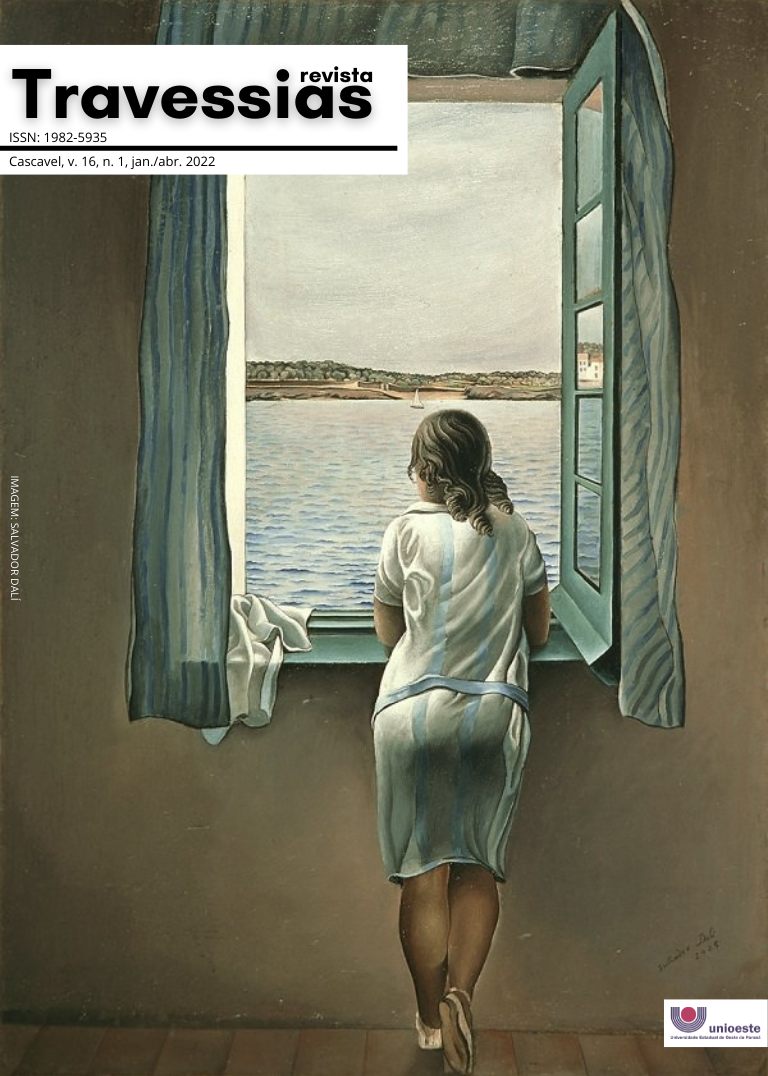Identidade discursiva e identidade cultural nas cantigas do congado mineiro
a identidade enunciada
DOI:
https://doi.org/10.48075/rt.v16i1.28500Palavras-chave:
identidade cultural, contrato comunicacional, congado, SemiolinguísticaResumo
Este trabalho discute a construção da identidade cultural de grupos de congado a partir de uma análise das cantigas de congado do centro-oeste mineiro por meio do aporte teórico da teoria semiolinguística de Charaudeau (2021, 2008, 2006, [2005a] 2021, [2005b] 2021, 2004). Para tanto, recorremos aos conceitos de contrato comunicacional, competências linguísticas e imaginários sociodiscursivos. Como uma teoria que dialoga com outras, conciliamos a abordagem semiolinguística com os conceitos de identidade, de Bauman (2005, 2003) e identidade cultural, de Hall (2012, 2006, 2003). Para abordar aspectos relacionados ao congado, recorremos aos trabalhos de autores como Mello e Souza (2002), Schechner (2012) e Silva (2010). Na perspectiva deste trabalho, a identidade cultural dos grupos de congado se constitui a partir da enunciação operada por esses grupos no âmbito de um papel social coletivo que desempenham durante as festividades do congado, evidenciando que a identidade é circunstancial, dada pela situação comunicacional em que esses grupos se encontram e nos quais enunciam sua identidade de congadeiro. Para efetivar esse processo identitário, o sujeito congadeiro mobiliza um conjunto de imaginários, na forma de saberes compartilhados pelo grupo, por meio dos quais representa a si mesmo, o grupo e também o reinado com seus respectivos rituais.
Downloads
Referências
ASSOCIAÇÃO DO REINADO DO ROSÁRIO DE ITAPECERICA (ARRI). Da festa e
dos Mistérios. Itapecerica: ARRI/Viola Correa Produções Artísticas, 2006. 2 CDs. Acompanha livreto.
BAUMAN, Z. Modernidade líquida. Rio de Janeiro: Jorge Zahar Editor, 2003.
BAUMAN, Z. Identidade: entrevista a Benedetto Vecchi. Rio de Janeiro: Jorge Zahar, 2005.
CASCUDO, L. C. Dicionário do folclore brasileiro. 5. ed. Belo Horizonte Itatiaia, 1984.
CHARAUDEAU, P. A manipulação da verdade: do triunfo da negação às sombras da pós-verdade. Youtube, 09 dez. 2020. Disponível em: https://www.youtube.com/watch?v=sG4Lbzt9nXI. Acesso em: 19 nov. 2021.
CHARAUDEAU, P. Uma teoria dos sujeitos da linguagem. In: LARA, G. M. P.; MACHADO, I. L; EMEDIATO, W. (org.). Análises do Discurso Hoje. Rio de Janeiro: Nova Fronteira/Lucerna, 2008. p. 11-30. v. 1.
CHARAUDEAU, P. Discurso político. São Paulo: Contexto, 2006.
CHARAUDEAU, P. L’identité culturelle entre soi et l’autre. In: COLLOQUE DE LOUVAIN-LA-NEUVE, 20., 2005. Louvain-La-Neuve. Actes de Colloque de Louvain-la-Neuve, Louvain-la-Neuve: Université de Louvain, Louvain-la-Neuve, 2005a. p. 1-7. Disponível em: http://www.patrick-charaudeau.com/L-identite-culturelle-entre-soi-et.html. Acesso em: 19 nov. 2021.
CHARAUDEAU, P. Identité sociale et identité discursive: un jeu de miroir fondateur de l’activité langagière. In: CHARAUDEAU, P. (org.). Identités sociales et discursives du sujet parlant. Paris: L`Harmattan, 2005b. p. 55-89.
CHARAUDEAU, P. Identités sociales, identités culturelles et compétences. In: CHARAUDEAU, P. Hommage à Paul Miclau (Références à compléter). Paris: Hachette, 2004. p. 1-7.
CONGADO MINEIRO. S. l.: Itaú Cultural, s.d. 1 CD.
HALL, S. Quem precisa de identidade? In: SILVA, T. T. (org). Identidade e diferença: a perspectiva dos estudos culturais. Petrópolis: Vozes, 2012. p. 103-133.
HALL, S. Identidade cultural na pós-modernidade. 11. ed. Rio de Janeiro: DP&A, 2006.
HALL, S. Da diáspora: identidades e mediações culturais. Belo Horizonte: Editora UFMG, 2003.
LAGES, S. R. C.; ARAÚJO, K. Identidade cultural e religiosidade: a festa de Nossa Senhora do Rosário de Bela Vista de Minas. Interações, Belo Horizonte, v. 12, n. 22, s. p., 2017. Disponível em: https://www.redalyc.org/jatsRepo/3130/313054587003/html/index.html. Acesso em: 18 set. 2021.
MARRA, F. B. Álbum de Família: Famílias Afro-descendentes no Século XX em Uberlândia-MG. Uberlândia: Prefeitura Municipal de Uberlândia/Secretaria Municipal de Cultura, 2005.
MARTINS, L. Afrografias da memória. São Paulo: Mazza Edições, 1997.
MELLO E SOUZA, M. Catolicismo negro no Brasil: Santos e minkisi, uma reflexão sobre miscigenação cultural. Afro-Ásia, v. 28, n. 1, p. 125-146, 2002. Disponível em: http://historia.fflch.usp.br/sites/historia.fflch.usp.br/files/catoliscismo.pdf. Acesso em 22 mar. 2021.
MIRANDA. A. Sociedade da informação: globalização, identidade cultural e conteúdos. Ciência da Informação, Brasília, v. 29, n. 2, p. 78-88, 2000. Disponível em: https://www.scielo.br/pdf/ci/v29n2/a10v29n2.pdf. Acesso em: 15 ago. 2021.
SCHECHNER, R. Ritual (do Introduction to Performance Studies). In: LIGIÉRO, Z. (org.). Performance e antropologia de Richard Schechner. Rio de Janeiro: Mauad X, 2012. p. 49-89.
SILVA, R. A. Negros católicos ou catolicismo negro? Um estudo sobre a construção da identidade negra no Congado mineiro. Belo Horizonte: Nandyala, 2010.
Downloads
Publicado
Como Citar
Edição
Seção
Licença
Copyright (c) 2022 Autores mantêm os direitos autorais e concedem à revista o direito de primeira publicação, com o trabalho simultaneamente licenciado sob CC-BY-NC-SA 4.0 que permite o compartilhamento do trabalho com indicação da autoria e publicação inicial nesta revista

Este trabalho está licenciado sob uma licença Creative Commons Attribution-NonCommercial-ShareAlike 4.0 International License.
Aviso de Direito Autoral Creative Commons
Política para Periódicos de Acesso Livre
Autores que publicam nesta revista concordam com os seguintes termos:
1. Autores mantêm os direitos autorais e concedem à revista o direito de primeira publicação, com o trabalho simultaneamente licenciado sob a Licença Creative Commons Attribution que permite o compartilhamento do trabalho com reconhecimento da autoria e publicação inicial nesta revista.
2. Autores têm autorização para assumir contratos adicionais separadamente, para distribuição não-exclusiva da versão do trabalho publicada nesta revista (ex.: publicar em repositório institucional ou como capítulo de livro), com reconhecimento de autoria e publicação inicial nesta revista.
3. Autores têm permissão e são estimulados a publicar e distribuir seu trabalho online (ex.: em repositórios institucionais ou na sua página pessoal) a qualquer ponto antes ou durante o processo editorial, já que isso pode gerar alterações produtivas, bem como aumentar o impacto e a citação do trabalho publicado (Veja O Efeito do Acesso Livre).
Licença Creative Commons
Esta obra está licenciada com uma Licença Creative Commons Atribuição-NãoComercial-CompartilhaIgual 4.0 Internacional, o que permite compartilhar, copiar, distribuir, exibir, reproduzir, a totalidade ou partes desde que não tenha objetivo comercial e sejam citados os autores e a fonte.



